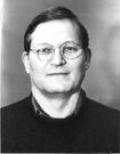Historical Violence Database
A Collaborative Research Project on the History of Violent Crime, Violent Death, and Collective Violence

Dedicared to the memory of Eric Monkkonen
Eric Monkkonen was a member of the Departments of History and Policy Studies at the University of California at Los Angeles and was past president of the Social Science History Association. He received his Ph.D. in History from the University of Minnesota. He was the author of many books, including The Dangerous Class: Crime and Poverty in Columbus, Ohio, 1860-1885, and Murder in New York City, a study of homicide in that city from 1790 to the present. At the time of his death in 2005, Eric was working on a history of homicide in Los Angeles and on a comparative study of urban homicide rates in the United States in the nineteenth and twentieth centuries.
Co-Directors

Randolph Roth is a Professor of History and Sociology at Ohio State. He is a member of the Editorial Board of the American Historical Review and a Fellow of the American Association for the Advancement of Science, and he served as a member of the National Academy of Sciences Roundtable on Crime Trends, 2013-2016. Professor Roth is the author of American Homicide (The Belknap Press of the Harvard University Press, 2009), which received the 2011 Michael J. Hindelang Award from American Society of Criminology for the outstanding contribution to criminology over the previous three years, and the 2010 Allan Sharlin Memorial Prize from the Social Science History Association for the outstanding book in social science history. The book is an interregional, internationally comparative study of homicide in the United States from colonial times to the present. Professor Roth is currently completing Child Murder in America, a study of homicides of and by children from colonial times to the present. It will be a companion volume to American Homicide. He is also the principal investigator on the National Homicide Data Improvement Project, a project funded by the National Science Foundation and the Harry Frank Guggenheim Foundation to improve the quality of homicide data in the United States from 1959 to the present. E-mail: roth.5@osu.edu

Douglas Eckberg is Professor Emeritus of Sociology at Winthrop University. He received his Ph.D. in Sociology from the University of Texas at Austin. He is the author of Intelligence and Race: The Origins and Dimensions of the IQ Controversy and of numerous articles on social movements, sociological methods, and homicide. Doug has recently published on trends in the lethality of violent crime and is studying the lethality of injuries from violence in the 19th-century U.S. E-mail: dougiesc11@gmail.com.

Joachim Eibach is Associate Professor of History at the University of Bern (Switzerland). He received his Ph.D in History from the University of Konstanz (Germany) and his Habilitation from the University of Giessen (Germany). In 2009, he received the CS Award for Best Teaching of the University of Bern. He is the author of a book on crime and criminal justice in 18th century Frankfurt on Main (Frankfurter Verhoere, Schöningh Verlag 2003). He has published 20 articles on crime, criminal justice and conflict settlement in the early modern period. His current research interests lie in the history of youth violence, communication around the house and intercultural contact. E-mail: joachim.eibach@hist.unibe.ch

Dr. Richard Mc Mahon is Assistant Professor in Modern History at Trinity College Dublin. His research centers on the history of violence, law and migration in nineteenth- century Britain, Ireland and North America. He is currently working on a history of violence relating to Irish migration to Glasgow, New York, San Francisco and Toronto in the nineteenth century funded by a research grant from The Harry Frank Guggenheim Foundation. He is also interested in the comparative history of violence in Ireland and Finland. He completed his PhD in the School of Law at University College Dublin in 2007 and has held research fellowships at NUI, Maynooth, the University of Toronto, the University of Tampere, the University of Edinburgh, New York University and Stanford University. His book, Homicide in pre-Famine and Famine Ireland was published in October 2013 by Liverpool University Press. E-mail: rimcmaho@tcd.ie

Dr. Manuel Eisner is Professor of Comparative and Developmental Criminology, Deputy Director of the Institute, and Director of the Social Science Research Methods Programme at the University of Cambridge. He is also a Private Docent in Sociology at the University of Zurich. Previously he was Associate Professor of Sociology at the Federal Institute of Technology in Zurich. He has published 15 authored or edited books and over 100 journal articles and book chapters in English, German, and French. Professor Eisner is a member of several editorial and advisory boards of academic journals and book series. He was awarded the Fellowship of the Society of Experimental Criminology in 2006 and is the 2011 recipient of the Sellin-Glueck award by the American Society of Criminology. The academic work of Professor Eisner revolves around two main areas, namely research on macro-level historical patterns of violence and research on individual development and the causes and prevention of aggressive behavior. E- mail: mpe23@hermes.cam.ac.uk
Investigators
Nina Dayton is a member of the History Department at the University of Connecticut and of the Editorial Board of the William and Mary Quarterly. She received her Ph.D. in History from Princeton University and is the author of Women before the Bar. She is writing a history of mental illness and of attitudes toward the mentally ill in New England, 1620-1830. Nina is also conducting research for a history of suicide in early New England. E-mail: dayton@sp.uconn.edu
Ken Wheeler is a member of the History Department at Reinhardt College. He received his Ph.D. in History from Ohio State University. Ken is writing a history of higher education in the Old Northwest in the nineteenth century and its role in the creation of Midwestern culture. E-mail: khw@mail.reinhardt.edu
Jim Watkinson is a research librarian at the Library of Virginia and has been an adjunct member of the History Department at Randolph-Macon College. He received his Ph.D. in History from the University of Virginia. Jim is writing a history of poverty in antebellum Virginia, titled Fit Objects of Charity: Attitudes toward and Treatment of the Poor in Rural Antebellum Virginia. E-mail: JWatkinson@lva.lib.va.us
Robb Haberman is a graduate student in the History Department at the University of Connecticut. Robb is conducting research for his doctoral dissertation on the development of magazine publishing in the United States, 1800-1860. E-mail: rosob@yahoo.com
Mike Denham is a member of the History Department at Florida Southern College and the director of the Florida History Center. He received his Ph.D. in History from Florida State University. He is the author of “A Rogue’s Paradise”: Crime and Punishment in Antebellum Florida" and co-author with William W. Rogers of Florida Sheriffs: A History. Mike is continuing his work on the history of crime and criminal justice in Florida. E-mail: jdenham@flsouthern.edu
Glenn McNair is a member of the History Department at Kenyon College. He received his Ph.D. in History from Emory University. Glenn is currently writing a history of slave crimes and the criminal justice system in Georgia from colonial times through the Civil War. E-mail: mcnairg@kenyon.edu
Carolyn Conley is a member of the History Department at the University of Alabama at Birmingham. She received her Ph.D. in History from Duke University. She is the author of The Unwritten Law: Criminal Justice in Victorian Kent, Melancholy Accidents: The Meaning of Violence in Post-Famine Ireland, and Certain Other Countries: Homicide, Gender, and National Identity in Late-Nineteenth Century England, Ireland, Scotland, and Wales. Carolyn’s latest book is Certain Other Countries: Homicide, Gender, and National Identity in Late Nineteen-Century England, Ireland, Scotland, and Wales (2007). E-mail: cconley@uab.edu
Roger Lane is an emeritus member of the History Department at Haverford College. He received his Ph.D. in History from Harvard University. He is the author of many books, including Murder in America, a study of homicide in the United States from colonial times to the present, Violence in the City, a study of suicides, homicides, and accidents in nineteenth-century Philadelphia, and Roots of Violence in Black Philadelphia, 1860-1900, which won the Bancroft Prize of the Society of American Historians. Now retired, Roger is writing novels, but he is still keenly interested in the history of violence. E-mail: rlane@haverford.edu
Gilles Vandal is a member of the Departments of History and Political Science at the University of Sherbrooke. He received his Ph.D. in History from the College of William and Mary. He is the author of The New Orleans Riot of 1866: The Anatomy of a Tragedy, and Rethinking Southern Violence: Homicides in Post-Civil War Louisiana, 1866-1884. Gilles has just completed a manuscript for a study of crime and justice in New Orleans, 1840-1885, and he has begun a study of crime and justice in rural Louisiana, 1840-1885. E-mail : gvandal@courrier.usherb.ca
Terri Snyder is a member of the Department of American Studies at the California State University at Fullerton. She received her Ph.D. in American Studies from the University of Iowa. She is the author of Brabbling Women: Disorderly Speech and the Law in Early Virginia and several articles on domestic violence and sexual coercion. Terri is currently researching the history of suicide in early Virginia. E-mail: snyder@fullerton.edu
The late Bud McKanna was an emeritus member of the Departments of History and American Indian Studies at San Diego State University. He received his Ph.D. in History from the University of Nebraska at Lincoln. He is the author of a number of books and essays, including Homicide, Race, and Justice in the American West, 1880-1920, and Race and Homicide in Nineteenth-Century California.
Jack Marietta is a member of the Department of History at the University of Arizona. He received his Ph.D. in History from Stanford University. A noted historian of Quakerism, he co-authored with Gail S. Rowe Troubled Experiment: Crime and Justice in Pennsylvania, 1682-1800. E-mail: jack-marietta@ns.arizona.edu
Gail Rowe is an emeritus member of the Department of History at the University of Northern Colorado. He received his Ph.D. in History from Stanford University. With Jack Marietta, he co-authored Troubled Experiment: Crime and Justice in Pennsylvania, 1682-1800. He is currently writing mystery novels. E-mail: growes36@attbi.com
Pieter Spierenburg is a member of the Department of History at Erasmus University in Rotterdam. He received his Ph.D. in History from the University of Amsterdam. He has published widely on capital punishment, the history of homicide, and the culture of honor in Europe. He is the author of numerous books and articles, including The Spectacle of Suffering: Executions and the Evolution of Repression. His latest book is: Written in Blood: Fatal Attraction in Enlightenment Amsterdam. E-mail: spierenburg@fhk.eur.nl
Mary Beth Emmerichs is a member of the Department of History at the University of Wisconsin-Sheboygan. She received her Ph.D. in History from the University of Pennsylvania. She is currently studying the history of homicide in nineteenth-century London. E-mail: memmeric@uwc.edu
Leigh Bienen is Senior Lecturer at the Northwestern University School of Law. She received her J.D. at the Rutgers School of Law. She has written on capital punishment, incest, rape, Nigerian homicide, and the relationship between the law and violent offenders. She is the author of many books and articles, including Crimes of the Century, which she co-authored with Gilbert Geis. She is currently studying the history of homicide in Chicago, 1870-1930. E-mail: lbbienen@law.northwestern.edu
Barbara Hanawalt is a member of the Department of History at Ohio State University. She received her Ph.D. in History from the University of Michigan. She has written widely on the social and cultural history of medieval England. Her books include Crime and Community in Medieval England, 1300-1348; The Ties that Bound: Peasant Families in Medieval England; and Of Good and Ill Repute: Gender and Social Control in Medieval England. Barbara served a term as president of the Social Science History Association. Her most recent book is The Wealth of Wives: Women, Law, and Economy in Late Medieval London (2007), a study of London women in the late Middle Ages. E-mail: hanawalt.4@osu.edu
The late Kevin Mullen was a retired member of the Police Department of the City of San Francisco, where he was Deputy Chief of Police. He is has a keen interest in the history of law enforcement and of San Francisco, and is the author of Let Justice Be Done: Crime and Politics in Early San Francisco. His last book was a history of homicide in San Francisco, titled Dangerous Strangers: Minority Newcomers and Criminal Violence in the Urban West, 1850-2000.
Jeffrey Adler is a member of the Departments of History and Criminology at the University of Florida. He received his Ph.D. in History from Harvard University. He is the author of First in Violence, Deepest in Dirt: Homicide in Chicago, 1875-1920 and of numerous essays on homicide and domestic violence. E-mail: jadler@history.ufl.edu.
Phil Schwarz is an emeritus member of the Department of History at Virginia Commonwealth University. He received his Ph.D. in History from Cornell University. He is the author of Twice Condemned: Slaves and the Criminal Laws of Virginia, 1705-1865; Slave Laws in Virginia; and Migrants Against Slavery: Virginians and the Nation. He is working on a history of slavery in Virginia and with Douglas Egerton on a collection of documents on Gabriel’s alleged insurrectionary plot in 1800 against slavery in Virginia. E-mail: pschwarz@saturn.vcu.edu
James Campbell received his Ph.D. in American Studies from the University of Nottingham. His is currently writing a history of criminal justice in antebellum Richmond, Virginia. He is also working on a comparative study of race and the judicial process in nineteenth-century free and slave societies. E-mail: jmcamp1@hotmail.com
James Rice is a member of the Department of History at the University at Plattsburg. He received his Ph.D. in History from the University of Maryland, where he wrote his dissertation on the history of crime and punishment in Frederick County, Maryland, 1748-1837. He is currently writing a history of the Potomac Country, 700-1800. E-mail: ricejd@plattsburgh.edu.
Howard Brown is the Chair of the Department of History at the University at Binghamton. He received his Ph.D. in History at Oxford University. studies the history of revolutionary France and is the author of Ending the French Revolution: Violence, Justice, Repression, which received the Walker Cowen Memorial Prize in Eighteenth-Century Studies from the American Historical Association. E-mail: hgbrown@binghamton.edu.
Andrew Stickley is a lecturer in the School of Social Sciences at Södertörns Högskola (University College of South Stockholm) and a researcher in SCOHOST (Stockholm Centre on Health of Societies in Transition). He received his Ph.D. in Sociology from Stockholm University. He is the author of numerous articles on the history of homicide in European Russia. He is currently writing on the history of homicide in St. Petersburg, 1890-1928. E-mail: andrew.stickley@sh.se.
Michael D. Maltz is an emeritus member of the Departments of Criminal Justice and of Information and Decision Sciences at the University of Illinois at Chicago and an adjunct member of the Department of Sociology at Ohio State University. He received his Ph.D. in Electrical Engineering from Stanford University. He is an expert on criminal statistics, and he has published numerous books and articles on techniques for making valid and useful inferences from data. He is the former editor of the Journal of Quantitative Criminology and a former visiting fellow of the Bureau of Justice Statistics in the U.S. Department of Justice. E-mail: mdm@sociology.osu.edu.
Paul Gilje is a member of the Department of History at the University of Oklahoma. He received his Ph.D. in History from Brown University. He is the author of several studies of collective violence in the United States, including Rioting in America and The Road to Mobocracy: Popular Disorder in New York City, 1763-1834. He is most recently the author of Liberty on the Waterfront: American Maritime Society and Culture in the Age of Revolution, 1750-1850 (2004), which won the Best Book Prize of the Society of Historians of the Early American Republic; and of Making of the American Republic, 1763-1815 (2006). E-mail: pgilje@ou.edu.
Peter Turchin is a member of the Department of Ecology and Evolutionary Biology at the University of Connecticut. He received his Ph.D. in Zoology from Duke University. Peter is an expert in the mathematical modeling of behavior and long-term macro-dynamic historical trends. He has created his own website, which you might visit. Peter's publications include Historical Dynamics: Why States Rise and Fall (2003), War and Peace and War: The Life Cycles of Imperial Nations (2006), and Secular Cycles (2009). At present, he is developing a time series of lethal group conflicts in the United States (riots, lynchings, etc.) as a measure of political instability. The series will be featured in his forthcoming book, A Demographic-Structural Analysis of American History, 1780-2010. E-mail: Peter.Turchin@UConn.edu.
John Coombs is a member of the Department of History at Hampden-Sydney College. He received his Ph.D. in History from William and Mary College. He is co-editor with Douglas M. Bradburn of Early Modern Virginia: New Essays on the Old Dominion, and the author of The Rise of Virginia Slavery, both forthcoming from the University Press of Virginia. His research focuses on the social, cultural, and economic history of the colonial Chesapeake. E-mail: jcoombs@hsc.edu.
Peter Bullock of Great Britain, who is retired, has taken an interest in researching Violent and Unexpected or Unexplained Deaths in England, Australia, New Zealand, and China. He is especially interested in the history of port cities. E-mail: zenocrate@163.com.
Cheryl Xie is a graduate of the Guangdong University of Foreign Studies, Guangzhou with a double degree of BA and BL. She is interested in the law system of ancient China, and especially the first contacts between the Chinese and Western law systems. At present she is an Assistant at the American International School of Guangzhou. E-mail: cherylying@tom.com.
Research Assistants
Mohammed Ali, Alexis Antracoli, Ross Bagby, John Callery, Brian Carroll, Adrianne Clark, Eliza Clark, Forrest Coen, Keegan Dwyer, Doug Gillette, Kelsey McCrea, Adriana Mancillas, Marie Martin, Jeffrey Meyer, Ashley Snead, Holly Wheaton, Albert Wolf
